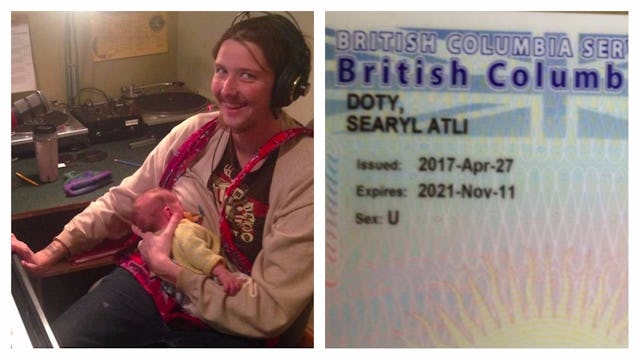Canadian Baby Becomes First To Not Be Assigned Sex At Birth

Baby in British Columbia possibly the first to not be assigned a sex at birth
While only on this earth for eight months, a baby born in Canada is already making history. The infant who was born in November is believed to be the first baby in the world to receive a health document that doesn’t specify female or male. The health card for the baby has a “U” marker where sex is listed.
Searyl Atli Doty was born in British Columbia, “outside the medical system,” according to the Gender Free I.D. Coalition, and did not undergo the traditional genital inspection at birth. The group believes the “U” stands for “Unspecified” or “Undetermined.”
Image via Gender Free I.D. Coalition
Parent Kori Doty identifies as non-binary trans and wants to avoid assigning gender to a child. “It is up to Searyl to decide how they identify, when they are old enough to develop their own gender identity,” Doty said in the statement. “I am not going to foreclose their choices based on an arbitrary assignment of gender at birth based on an inspection of their genitals.”
Kori who prefers the pronoun “they” told CBC, “When I was born, doctors looked at my genitals and made assumptions about who I would be, and those assignments followed me and followed my identification throughout my life. Those assumptions were incorrect, and I ended up having to do a lot of adjustments since then.”
In a video posted by CNN, Kori further explains the decision to not specify sex, “I want to be able to give them the most open opportunity to develop as a whole human. I don’t want to be restricting them to what might come with a box as guessed by what their genitals look like.”
The British Columbia province is reportedly refusing to issue Searyl a birth certificate with no gender on it, but it did send the health card with the “U” on it. So at least the baby could have access to medical services. No further explanation was offered in the documentation.
If you’re not privy to the Canadian health care system, here it is briefly: health cards give citizens access to public health care services and have to be shown each time a medical service is used. Canada has a universal health-care system that’s paid for by taxes.
While it’s a triumph for the baby to be issued a health card, it still doesn’t make this problem of not being issued a birth certificate go away. British Columbia requires a female or male designation even though some other Canadian provinces, including Ontario and Alberta, are reviewing their policies to include a third, non-binary gender option on health documents. That being said, Kori has a lawyer and is fighting to not have an assigned gender put on Searyl’s birth certificate.
In the United States, similar policies are brewing that would help eliminate the reductive “male” and “female” options. On Monday, Oregon became the first state to offer a third gender option on state-issued documents. This means residents can select “X” for “not specified” as their gender on state IDs, driver’s licenses, and driver permits, according to KOBI.
In a video interview on YouTube, Kori explains their philosophy when it comes to raising a child without gender.
“A lot of what we understand to play into gendered socialization like how men are supposed to be or how women are supposed to be starts really really early, oftentimes before a baby is even born,” they say.
Kori hits on the fact that even when we learn in our ultrasounds if the baby has a vagina or a penis, we start to talk to them differently and develop expectations for them not as humans, but as gendered humans.
“Understanding gender as a spectrum breaks it out of a binary concept where there’s only two options of man and woman, male and female, masculine and feminine, and instead looks at the ways humans relate to their gender, how they feel, and how they present.”
Additionally, Kori says it really comes down to making space for exploration and quite literally thinking outside of the box.
“The way I’m approaching gender with my baby Searyl is basically I’m just leaving room for their self-determination of their gender to come through.”